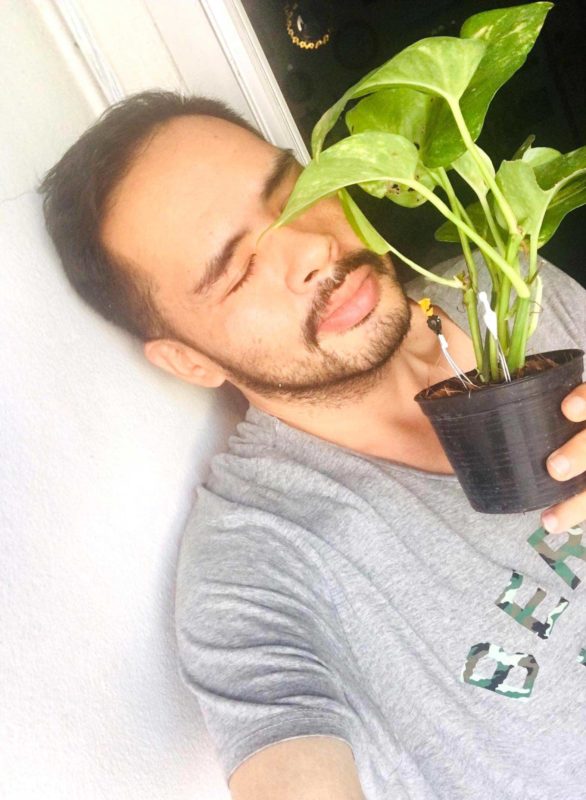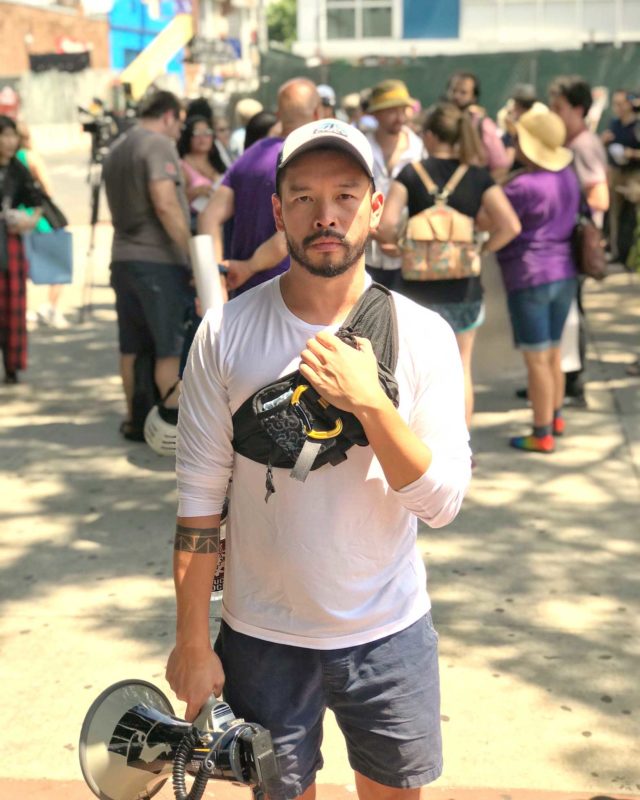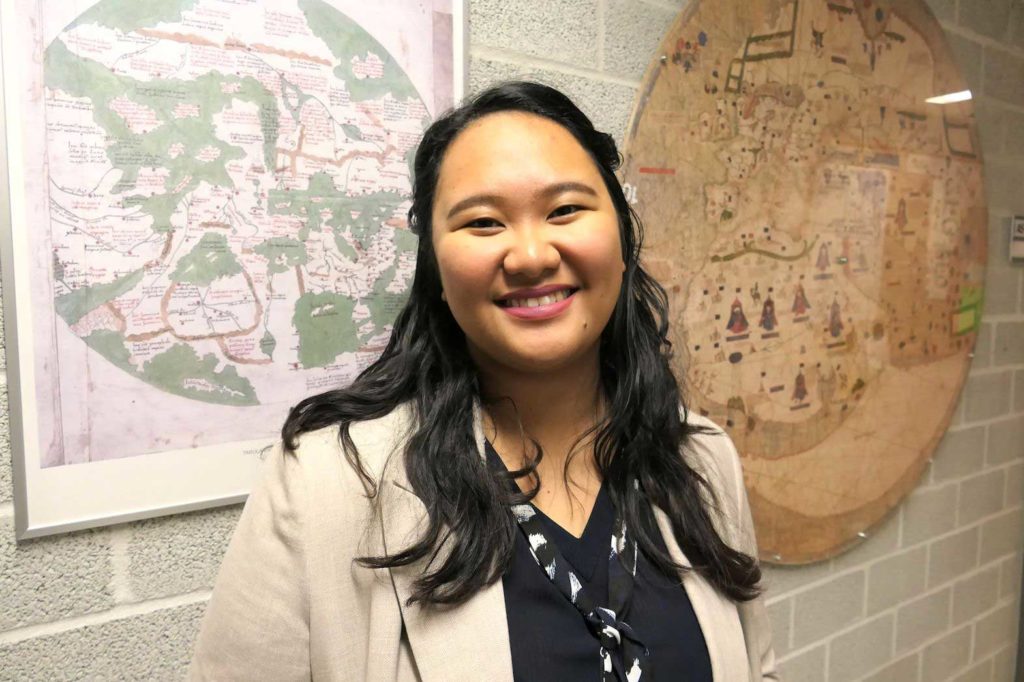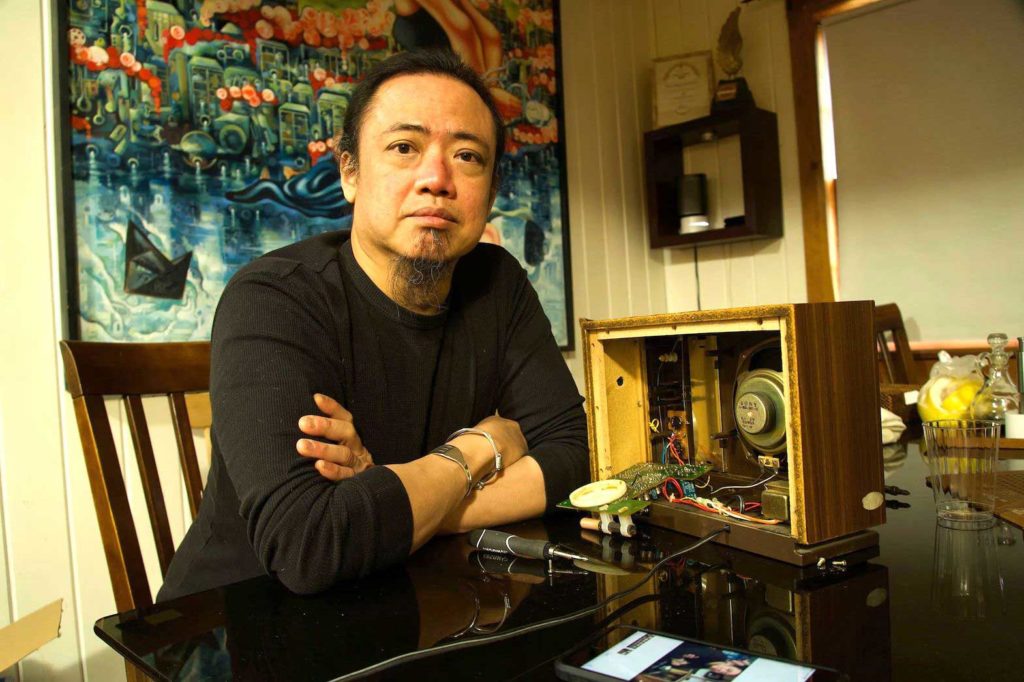How we’re are coping with the pandemic across the globe

Joel Mark Barredo and his plant, Melba, in Bangkok. CONTRIBUTED
As cities around the world are in lockdown due to the alarming increase of COVID-19 infections, people are struggling to adjust to this new normal. Schools and universities migrate from face-to-face to online platforms. Although some businesses in the service sectors remain open, uncertainty hangs in the air.
“Just like everyone else around the world the stark reality of COVID-19 hit me hard as a New Yorker,” Kalaya’an Mendoza, says. “I always prayed that my prepping skills and holistic safety and security experience and training would ever be as needed as it is now.” Mendoza is a preparedness expert who conducts training through his organization Across Frontlines.
It seems people are learning to cope with physical distancing but on the whole remain in solidarity with one another even across the globe. Every day, social media are abuzz with free tutorials, from creative writing, yoga, exercises to giving tips on gardening, survival and Tik-Tok to prevent “cabin fever.”

New Yorker Kalaya’an Mendoza is a preparedness expert. CONTRIBUTED
Tik-Tok is a Chinese video-sharing social networking service used to create short dance, lip-sync, comedy and talent videos. It has become very popular in easing boredom. Cabin fever is a syndrome associated with being isolated in a building for a period of time.
How is your day in quarantine/lockdown?
Re-connecting with self and ‘living beings’
“I found that my Buddhist practice has helped me to manage day to day anxieties along with this feeling of existential dread. By meditation I have found a sense of peace in that whatever might happen to me, I can dedicate whatever time I have on this planet to dedicate alleviating the suffering of others,” Kala’yaan says.
Albert Centeno agrees. His aging parents live in Spain, which has thousands of COVID cases.
“I’m a bit scared. But meditation and exercise help me focus on the bright side,” he says.

Justine Abrugena, works at the University of Oldenburg in Germany. CONTRIBUTED
Joel Mark Barredo, a human rights scholar in Bangkok used to travel a lot in Asia Pacific Region. COVID-19 halted his activities. With the social distancing practiced in Thailand, Joel does not want to isolate himself from another living being. He bought a plant for 50 baht and decided to call it Melba.
“I finally decided to welcome Melba, a living thing, into my life. While the world heals, we will be taking care of each other,” Barredo shares.
Two months ago, Lizette Zambrano, an executive in Bangkok, started buying seeds. She was able to grow basil, alugbati, cherry tomatoes, oregano, and spinach in small pots. She has already harvested spinach, oregano and alugbati. She says that pot gardening helps her ease tension.
Returning to hobbies, finding new interests
In North Babylon, New York, Ariel Capitulo, a guitar and amplifier technician at Supro, has been in voluntary unpaid leave since March 17. The state lockdown started on March 22. Ariel is also an award-winning art photographer. He says that he has now more time to take photos, which he usually does only on weekends.
“I slowed down a bit. My focus now is to print my photos and talk to gallery owners for exhibitions (after the pandemic),” Capitulo says.
Although Gloria Pangilinan, a retiree in New Jersey, misses many things like attending church services, she now has more time tutoring and taking care of her two grandchildren. Gloria’s daughter is a nurse.
Arvin Escatron, a graduate student in Bangkok, has not done Tik-tok yet. He uses his talent in creating funny cooking and exercising videos to post on YouTube to entertain his friends and also to kill boredom. He lives in a 28-square meter space.
“I am an outdoorsy person. I anticipate that cabin fever would tip the balance of my regular routine. So there. The boundless energy has to be channeled somewhere,” Escatron says.
Linking up in social media
Since John Lopez works in the food industry in Winnipeg, Canada, he still reports for work. Being a migrant worker, his insurance coverage includes COVID testing and medications. If his work place shuts down, he has benefits too. He is more worried for his family in community quarantine in Oriental Mindoro.

Ariel Capitulo, is a guitar and amplifier techinician in Babylon, New York. CONTRIBUTED
“Almost every day, we communicate via social media, to update me on their situation,” Lopez says.
In Germany, Justine Abrugena, a research and project assistant at the University of Oldenburg, communicates with friends and family members via video-call. Her siblings are in Manila, and their parents are in Spain. Although Germany is not yet locked down, there are many restrictions in movements and physical distancing is practiced.
“Even without talking, just having that virtual co-presence while multitasking alleviates worries,” Abrugena says.
However, Abrugena feels less productive even if she is working at home. Her university will open on April 12, but is still monitoring the situation. Germany has more than 27 thousand cases of Covid-19.
On March 21, Roy Wadia, a development worker launched Viral Kindness Bangkok Facebook Page, “for those who live in, and/or love, Bangkok to provide good cheer and support to one another during these challenging times — in whatever way one can, through art, music, poetry, story-sharing, health and wellness tips, whatever inspires and touches you. Humor too,” according to his page.
Migration to online platforms
Jestoni Dagdag, of DagDag Dance in California says that performers, dance teachers and studio owners are financially struggling due to the cancellation or postponement of events.
“Dancers and dance teachers are able to offer free virtual dance classes. Some offer fairly discounted rates for private classes through live-stream videos on YouTube, Facebook, Instagram and other online platforms,” he says.
Dagdag also explains that virtual dance classes have existed long before this pandemic. “I believe dance is something to be experienced in person whether that is in class or a show.”
In Bologna, Italy, Elisha Gay Hidalgo, finds tutorial work online, especially now that schools move teaching and learning online, like in a home school. She is also improving her Italian by learning online.
“I’m checking up on our MA students who got stuck all over the world while doing their fieldwork. I am also coordinating with veteran professors on how we suddenly have to transition to digital classrooms and teaching,” Justine Abrugena says.
Workers on the frontlines are also coping with COVID-19.
Heidelweiss Erardo is already 59 years old, but she believes that as a nurse she has a responsibility to serve people in times like this. She reports for work three times a week.
“In Washington state, the precautionary measures to protect health workers, patients and the community are superb,” Erardo says.
Despite this, fear remains because relatively little is still known about the virus. Erardo knows that at her age, she is vulnerable and might transmit it to family members. Her husband, Darius, is also vulnerable due to age and underlying health condition.
Positivity in times of negativity
Professor Leny Strobel shares her positivity in facing the pandemic.
“It is a wake-up call. This crisis calls forth a different reckoning — a turning inward, self-reflection — that will compel us to change our habits and beliefs.”
“Life is and has always been transitory; what matters is how we cultivate compassion for others and ourselves. Whether it is in small acts of love like reaching out to people in my life to check in on them or finding ways to assist others outside of my circle in service and solidarity,” Mendoza concludes.

